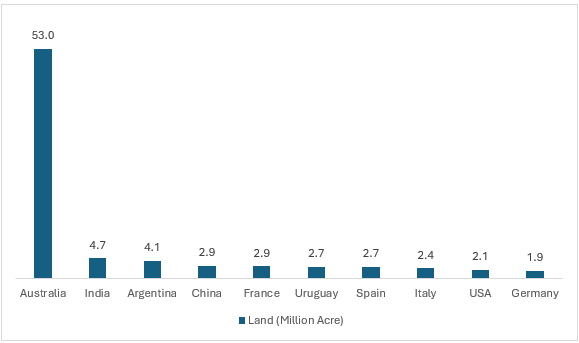
Consumer Insights
Uncover trends and behaviors shaping consumer choices today
Procurement Insights
Optimize your sourcing strategy with key market data
Industry Stats
Stay ahead with the latest trends and market analysis.
Trending Now



The global vegetable seed market reached a value of USD 8920.93 Million in 2024. The industry is expected to grow at a CAGR of 5.46% during the forecast period of 2025-2034. The market is driven by a growing demand for food security due to increasing population, popularity of digital farming, and growing research and development expenditure by seed producers. These factors are the key drivers of the vegetable seed market, thus aiding the market in attaining a valuation of USD 15180.56 Million by 2034.
Base Year
Historical Year
Forecast Year
With seeds contributing 74% to crop yield gains, they remain crucial to achieving sustainability targets in agricultural production. Policies such as the EU Farm to Fork strategy and the National Organic Program (NOP) in the USA, emphasising organic farming and reduced chemical use, are driving demand for high-value organic seeds.
The growth in vegetable production aids the demand for vegetable seeds. In 2023, tomatoes, romaine lettuce, and carrots claimed the highest production values in the USA, accounting for 34% of the utilised value of production. In 2023, the value of utilised production for vegetable crops in the USA was USD 19.5 billion.
The rise in vegan population aids the demand for plant-based diets, thus, supporting the market for vegetable seeds. Consumers are increasingly opting for plant-based foods due to health consciousness, environmental concerns, and ethical considerations. It is estimated that in 2025, 9% of the Asia Pacific region is reported to be following a vegan diet, followed by 6% in the Middle East and Africa and 4% in Latin America.






Value in USD Million
2025-2034
Vegetable Seed Market Outlook
*this image is indicative*
| Global Vegetable Seed Market Report Summary | Description | Value |
| Base Year | USD Million | 2024 |
| Historical Period | USD Million | 2018-2024 |
| Forecast Period | USD Million | 2025-2034 |
| Market Size 2024 | USD Million | 8920.93 |
| Market Size 2034 | USD Million | 15180.56 |
| CAGR 2018-2024 | Percentage | XX% |
| CAGR 2025-2034 | Percentage | 5.46% |
| CAGR 2025-2034 - Market by Region | Latin America | 4.5% |
| CAGR 2025-2034 - Market by Country | India | 5.4% |
| CAGR 2025-2034 - Market by Country | Brazil | 5.2% |
| CAGR 2025-2034 - Market by Type | Hybrid | 4.9% |
| Market Share by Country 2024 | Japan | 4.8% |
The global vegetable seed market continues to grow with increasing demand for food security due to increasing population, innovation in seed technology, and growing research and development expenditure by seed producers and governments of the USA, China and India. Agritech innovations are gaining popularity, aiding the global vegetable seed market growth.
There is a growing trend of hybridisation of seeds to improve the grain qualities, reduce pest incidence and increase the overall crop productivity. By 2050, global food production is projected to increase by 70% compared to 2005-07. Additionally, the growing popularity of protected agriculture supports the vegetable seed demand. Protected agriculture enables the cultivation of high-value vegetables and horticultural crops in greenhouses, allowing farmers to grow cash crops in water-scarce, non-arable areas where traditional farming is impractical. This technology, originally developed and tested by ICARDA in the Arabian Peninsula, has been adapted and successfully used in smallholder farming systems in Afghanistan, Pakistan, and Yemen.
Seed technology is gaining traction to enhance seed performance, physical purity, germination and plant health. By improving yield and helping growers optimise the use of agricultural land, seed technologies contribute to global food security. Key technologies include PPP loading analysis, Heubach Technology and DNA Technology. In 2024, more than 96 million hectares of agricultural land were managed organically by at least 4.5 million farmers. Non-GMO seeds help to protect organic farms by reducing the risk of contamination.
Figure: Key Countries with Largest Organic Farming Land (Million Acre), 2022

The global vegetable seed market development is supported by the expansion in agricultural production and growth in agricultural research and development expenditure.
The higher demand for food grains drives the vegetable seed market. During the 2017-2022 period, global vegetable production grew by 1.2% per year, thus, expanding opportunities for vegetable seed producers. By 2050, 90% of global crop production growth (80% in developing countries) is projected to come from higher yields and cropping intensity. Arable land will increase by 70 million ha (under 5%), with developing countries adding 120 million ha (12%), offset by a 50 million ha (8%) decline in developed nations. Most expansion is expected to occur in sub-Saharan Africa and Latin America, aiding the vegetable seed demand in such regions.
The expanding vegan population is set to drive market growth, with increasing consumer preference for plant-based diets. By 2030, the plant-based food industry is projected to capture a substantial share of the global protein market, reaching an estimated value of USD 162 billion. This growth is fueled by rising health awareness, sustainability concerns, and advancements in plant-based food innovation, further strengthening demand for high-quality vegetable seeds.
Technological advances, product development, and innovation in digital farming drive global vegetable seed market expansion.
The incorporation of artificial intelligence and machine learning plays a crucial role in modern plant breeding. These technologies can accurately predict seed quality parameters such as germination rate, vigor, and disease resistance.
Hybrid seeds improve the characteristics of the resulting plants, such as better yield, greater uniformity, improved color, and disease resistance. Additionally, non-GMO seeds accelerate the production of more resilient, productive crops.
Seed producers are expanding their distribution channels through e-commerce. For instance, in October 2023, Sakata Seed Corporation announced the launch of an e-commerce platform for vegetable seeds to facilitate access to its products, promoting efficiency and modernisation.
Governments around the world are emphasising food security. As a result, seed and vegetable seed-related schemes and regulations are gaining momentum. For instance, in the USA, the Federal Seed Act regulates the interstate commerce of agricultural and vegetable seeds, mandating accurate labeling and prohibiting the sale of mislabeled or contaminated seeds. It includes the kind of seed, germination rate, inert matter and labelling requirements.
The latest trend in the global vegetable seed market include the expansion in agricultural land and the growing popularity of protected agriculture. The expansion in global agriculture land has correlated with the population growth over the years. Between 1961 and 2020, global agricultural output surged fourfold, driven by advancements in farming techniques, mechanization, and improved seed varieties. During the same period, agricultural land expanded by 7.6%, reflecting efforts to meet rising food demand. By 2020, agricultural land accounted for 32% of the world's total land area, highlighting the sector's critical role in sustaining global food production.
Digital farming is gaining traction to increase efficiency in the field and optimises the planting area, standardising the distance between seeds and allowing increased productivity in the same area. For instance, Syngenta AG has employed cutting-edge technologies, such as the company's flagship Cropwise platform to support sustainable farming and improve productivity.
Vegetables serve as rich sources of vitamins, plant-based protein, fibre, and antioxidants. The consumers' growing demand for healthy eating drives the demand for vegetable seeds. In 2023, the largest vegetable-producing country, China's vegetable output reached 828.68 million tons, compared to 700 million tons in 2018. Additionally, the rural revitalisation strategy and the construction of green agricultural products in China support the demand for vegetable seeds.
Organic vegetable cultivation represents a sustainable farming system that enhances long-term soil health while ensuring consistent and stable production. In 2023, more than 76 million hectares of agricultural land were managed organically by at least 3.7 million farmers globally. In 2022, Australia owned the largest organic agricultural land with a total area of 53 million acre.
Public investment in agricultural research and development (R&D) plays a key role in enhancing global food security and environmental sustainability. Governments worldwide are increasing funding to drive innovation, improve productivity, and develop sustainable farming practices. In 2023, the U.S. allocated USD 2.8 billion to agricultural R&D, reflecting a strong commitment to advancing crop yields, precision farming, and resilient food systems. This investment is expected to support long-term growth in agricultural efficiency and sustainability.
Global vegetable seed market challenges include high cost, long seed development cycles, and irregular weather conditions.
Vegetable seed production requires long development cycles including specific care in pre-harvest stages, such as isolation and roguing, during harvesting and extraction, and post-harvest operations such as drying, processing, packaging and storage. As a result, most vegetable seeds are considered high value and low volume compared to other field crops.
“Vegetable Seed Market Report and Forecast 2025-2034” offers a detailed analysis of the market based on the following segments:
On the basis of type, the market can be divided into the following:
On the basis of crop type, the market can be divided into the following:
On the basis of cultivation method, the market can be divided into the following:
Based on region, the market can be segregated into:
| CAGR 2025-2034 - Market by | Country |
| India | 5.4% |
| Brazil | 5.2% |
| Saudi Arabia | 4.9% |
| China | 4.9% |
| Canada | 4.6% |
| USA | XX% |
| UK | 4.1% |
| Germany | XX% |
| France | XX% |
| Italy | XX% |
| Japan | XX% |
| Australia | XX% |
| Mexico | XX% |
Market Analysis by Type
Hybrid is expected to hold a significant share in the global vegetable seed market report due to the growing demand for food security. Growing research and development (R&D) spending has resulted in successful developments of hybrids over the years. Hybrid seeds or F1 seeds are a result of cross pollination. These seeds have a better chance of survival, and the yield is much higher. The growth in population aids the demand for food security. As a result, demand for such seeds is growing. By 2050, global food production is projected to increase by 70% compared to 2005-07.
Market Analysis by Crop Type
The Solanaceae, also known as the potato or deadly nightshade family, contains some of the world’s most important food plants, including the potato, tomato, peppers, and eggplant. Advancement in the production of potato seeds, aids the market.
In June 2024, Bayer and Solynta partnered to commercialise and distribute true potato seeds in Kenya and India. This collaboration marks Bayer's entry into the global potato market. Growers can now start a crop with just 25 grams of the true potato seeds per hectare, a significant reduction from the previous requirement of 2,500 kg of perishable seed tubers.
Market Analysis by Cultivation Method
Protected agriculture is expected to witness significant growth during the forecast year. Protected agriculture includes structures ranging from basic polytunnels to sophisticated greenhouses, which enhance production intensity and seed prices. Protected agriculture lowers the carbon footprint by shortening food transport distances, ensuring fresher produce with faster farm-to-market delivery.
Countries such as China, India, Spain, Mexico, and Japan lead in the adoption of protected agriculture, driving higher yields compared to open-field production methods.
North America Vegetable Seed Market Dynamics
The growing demand for organically produced vegetables in North America drives the vegetable seed industry growth. In the U.S., the demand for high-quality vegetable seeds is rising as farmers seek improved crop yields, disease resistance, and better adaptability to changing environmental conditions.
In 2023, U.S. organic fruits and vegetable sales reached USD 20.5 billion, and Canada’s organic sector had a farm-gate value of USD 174.3 million, driving the adoption of organic farming practices, thus pushing the demand for organic vegetable seeds, supporting vegetable seed market growth.
Europe Vegetable Seed Market Dynamics
As per the vegetable seed market analysis, the market is expanding in Europe due to the innovations in farming such as greenhouse farming, and climate-resilient vegetable production and breeding programs.
The share of EU agricultural land under organic farming increased by more than 50% over the period 2012-2020, with an annual increase of 5.7%. Organic area made up 10.5 % of total EU agricultural land in 2022. Furthermore, in 2023, France’s greenhouse sector managed 1,130 hectares of space, significantly contributing to the country’s agricultural output, and driving the vegetable seed demand growth by increasing demand for seeds varieties optimised for controlled growing environments.
Asia Pacific Vegetable Seed Market Opportunities
The Asia Pacific vegetable seed market is expanding due to the presence of large agricultural land in countries such as China, India and Australia and the growth in food demand coupled with expanding population.
As per 2023 data, Asia-Pacific holds the most agricultural area globally with 1.68 billion hectares. China presented over 600 new vegetable varieties, including cucumbers, tomatoes, chilies, purple peppers, and eggplants, at the 25th Shouguang Sci-Tech Fair. This reflects efforts to reduce seed imports, with 15% still sourced externally. The government supports domestic breeding programs to strengthen food security and agricultural self-sufficiency.
From 2005 – 2020, a total of 14,366 hectares of greenhouses have been established across India of which vegetables occupy 60% of the total greenhouse area. This trend underscores the growing demand for vegetable seeds that can thrive in optimised, climate-controlled conditions, driving the need for high-performance seed varieties.
Latin America Vegetable Seed Market Insights
The Latin America vegetable seed market is gaining traction due to the growing popularity of government initiatives promoting modern agriculture. Furthermore, a diverse climate and expanding population also drives the demand for premium and climate-resilient seeds.
A rise in government support and increasing focus on genetic improvements in Brazil is expected to boost the growth of the vegetable seed market. In August 2024, the government of Brazil announced USD 88.2 billion allocation in Brazil's 2024/25 Crop Plan, which reflects growing agricultural financing to support farmers struggling with challenging market conditions.
Middle East and Africa Vegetable Seed Market Drivers
The Middle East and Africa vegetable seed market is driven by rising food demand and expansion of protected agriculture. The expected MEA’s population of 3.4 billion by 2025 is expected to drive the market. In December 2024, Topian launched its first AI-driven greenhouse in Saudi Arabia, set to produce nearly 4,000 tonnes of fruits and vegetables annually.
A growing demand for protected and open field vegetable seeds in Saudi Arabia drives the vegetable seed demand forecast. The demand for greenhouse vegetable seeds in Saudi Arabia primarily focuses on seeds for tomatoes, eggplants, cucumbers, peppers, and sweet peppers. Additionally, there is significant demand for open-field seeds, including those for pumpkins, zucchinis, carrots, onions, and watermelons.
The global vegetable seed market players are concentrating in leveraging advanced technologies and investing in agricultural research and development to gain competitive edge.
Founded in 1965, the company is headquartered in France. Limagrain is an agricultural cooperative specialising in breeding, producing, and distributing field seeds, vegetable seeds, and agricultural food products. With a focus on innovation and sustainability, Limagrain works to enhance crop productivity and food security.
Founded in 1863 and headquartered in Germany, Bayer AG is a global leader in healthcare and nutrition, dedicated to addressing essential human needs. Its vegetable seed brands, Seminis and De Ruiter, provide more than 20 type of high-quality organic and conventional seeds for various crops, including tomatoes, cucumbers, beans, cabbages, cauliflowers, eggplants, melons, onions, peppers, and watermelons, brassicas, leafy greens, and root vegetable, rootstocks, sweet corn, among others.
Founded in 1865 and headquartered in Germany, the company specialises in production and distribution of a range of products, including chemicals, plastics, performance products, and crop protection products. The company offers more than 1,200 seed varieties in 24 vegetable crops under brand name Nunhems which includes artichoke, carrot, cucumber, celeriac, gourd, hot pepper, leek, lettuce, onion, okra.
Founded in 2000 and headquartered in Switzerland, Syngenta is a leading global agriculture company committed to helping feed the world while protecting the planet. The company offers 30 crop species and over 2,500 varieties of vegetables under the Syngenta Vegetable Seeds brand, which includes a wide range of vegetable seeds across multiple categories.
*Please note that this is only a partial list; the complete list of key players is available in the full report. Additionally, the list of key players can be customized to better suit your needs.*
Other key players in the global vegetable seed market are Rijk Zwaan Zaadteelt en Zaadhandel BV, TAKII & CO.,LTD, Sakata Seed Corp., and Enza Zaden Beheer B.V., among others.
*While we strive to always give you current and accurate information, the numbers depicted on the website are indicative and may differ from the actual numbers in the main report. At Expert Market Research, we aim to bring you the latest insights and trends in the market. Using our analyses and forecasts, stakeholders can understand the market dynamics, navigate challenges, and capitalize on opportunities to make data-driven strategic decisions.*
Get in touch with us for a customized solution tailored to your unique requirements and save upto 35%!
The global vegetable seed market is assessed to grow at a CAGR of 5.46% between 2025 and 2034.
The major market drivers are the increasing population and growing demand for vegetables.
The key market trends include the growing food industry, increasing health consciousness among consumers, and advancements in agricultural technology.
The market is broken down into North America, Europe, Asia Pacific, Latin America, the Middle East, and Africa.
Based on the type, the market is divided into open-pollinated varieties and hybrid.
Based on the crop type, the market is divided into solanaceae, root and bulb, cucurbit, brassica, leafy and others.
The different cultivation methods for vegetable seeds include protected and open fields.
The market's key players are Limagrain Group, Bayer AG, BASF SE, Syngenta AG, Rijk Zwaan Zaadteelt en Zaadhandel BV, TAKII & CO., LTD, Sakata Seed America, and Enza Zaden Beheer B.V., among others.
In 2024, the market reached an approximate value of USD 8920.93 Million.
The global vegetable seed market is estimated to witness healthy growth in the forecast period of 2025-2034 to reach a value of around USD 15180.56 Million by 2034.
Explore our key highlights of the report and gain a concise overview of key findings, trends, and actionable insights that will empower your strategic decisions.
| REPORT FEATURES | DETAILS |
| Base Year | 2024 |
| Historical Period | 2018-2024 |
| Forecast Period | 2025-2034 |
| Scope of the Report |
Historical and Forecast Trends, Industry Drivers and Constraints, Historical and Forecast Market Analysis by Segment:
|
| Breakup by Type |
|
| Breakup by Crop Type |
|
| Breakup by Cultivation Method |
|
| Breakup by Region |
|
| Market Dynamics |
|
| Trade Data Analysis |
|
| Competitive Landscape |
|
| Companies Covered |
|
Datasheet
One User
USD 2,499
USD 2,249
tax inclusive*
Single User License
One User
USD 3,999
USD 3,599
tax inclusive*
Five User License
Five User
USD 4,999
USD 4,249
tax inclusive*
Corporate License
Unlimited Users
USD 5,999
USD 5,099
tax inclusive*
*Please note that the prices mentioned below are starting prices for each bundle type. Kindly contact our team for further details.*
Flash Bundle
Small Business Bundle
Growth Bundle
Enterprise Bundle
*Please note that the prices mentioned below are starting prices for each bundle type. Kindly contact our team for further details.*
Flash Bundle
Number of Reports: 3
20%
tax inclusive*
Small Business Bundle
Number of Reports: 5
25%
tax inclusive*
Growth Bundle
Number of Reports: 8
30%
tax inclusive*
Enterprise Bundle
Number of Reports: 10
35%
tax inclusive*
How To Order
Our step-by-step guide will help you select, purchase, and access your reports swiftly, ensuring you get the information that drives your decisions, right when you need it.

Select License Type
Choose the right license for your needs and access rights.

Click on ‘Buy Now’
Add the report to your cart with one click and proceed to register.

Select Mode of Payment
Choose a payment option for a secure checkout. You will be redirected accordingly.
Gain insights to stay ahead and seize opportunities.

Get insights & trends for a competitive edge.

Track prices with detailed trend reports.

Analyse trade data for supply chain insights.

Leverage cost reports for smart savings

Enhance supply chain with partnerships.

Connect For More Information
Our expert team of analysts will offer full support and resolve any queries regarding the report, before and after the purchase.
Our expert team of analysts will offer full support and resolve any queries regarding the report, before and after the purchase.
We employ meticulous research methods, blending advanced analytics and expert insights to deliver accurate, actionable industry intelligence, staying ahead of competitors.
Our skilled analysts offer unparalleled competitive advantage with detailed insights on current and emerging markets, ensuring your strategic edge.
We offer an in-depth yet simplified presentation of industry insights and analysis to meet your specific requirements effectively.



Australia
63 Fiona Drive, Tamworth, NSW
+61-448-061-727
India
C130 Sector 2 Noida, Uttar Pradesh 201301
+91-723-689-1189
Philippines
40th Floor, PBCom Tower, 6795 Ayala Avenue Cor V.A Rufino St. Makati City,1226.
+63-287-899-028, +63-967-048-3306
United Kingdom
6 Gardner Place, Becketts Close, Feltham TW14 0BX, Greater London
+44-753-713-2163
United States
30 North Gould Street, Sheridan, WY 82801
+1-415-325-5166
Vietnam
193/26/4 St.no.6, Ward Binh Hung Hoa, Binh Tan District, Ho Chi Minh City
+84-865-399-124
United States (Head Office)
30 North Gould Street, Sheridan, WY 82801
+1-415-325-5166
Australia
63 Fiona Drive, Tamworth, NSW
+61-448-061-727
India
C130 Sector 2 Noida, Uttar Pradesh 201301
+91-723-689-1189
Philippines
40th Floor, PBCom Tower, 6795 Ayala Avenue Cor V.A Rufino St. Makati City, 1226.
+63-287-899-028, +63-967-048-3306
United Kingdom
6 Gardner Place, Becketts Close, Feltham TW14 0BX, Greater London
+44-753-713-2163
Vietnam
193/26/4 St.no.6, Ward Binh Hung Hoa, Binh Tan District, Ho Chi Minh City
+84-865-399-124
Share